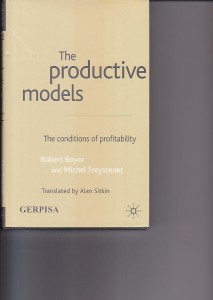Les cahiers du Lasaire, « susciter une nouvelle ambition industrielle pour la France », n° 42, mars 2011, p. 25-52.
La connexion des réseaux comme facteur de changement institutionnel. L’exemple des vins de Bourgogne
(en collaboration avec Denis Boyer et Gilles Laferté),
dans Gérard Weisbuch & Hervé Zwirn (dir.) Qu’appelle-t-on aujourd’hui les sciences de la complexité ? Langages, réseaux, marchés, territoires, Vuibert, Collection Philosophie des sciences, Paris, 2010, p. 73-101.
Postface à l’ouvrage de Gilles Laferté : L’image de la Bourgogne et de ses vins : Le contrôle politique et culturel du marché, Albin Michel, Paris, 2006, p. 251-262.
dans Economia e politica industriale. Rassegna trimestriale diretta da Sergio Vaccà, Franco
Angeli, anno XXVIII, n°110, Milano, 2001, p. 33-68.
(en collaboration avec Michel Freyssenet), Revue Française de Gestion, n° 131, Novembre-décembre 2000, p.20-28.
Gabriel Dupuy et François Bost Eds, L’automobile et son monde,
Editions de l’aube, Saint-étienne, 2000, p. 9-30
(en collaboration avec Michel Freyssenet), Industrielle Beziehungen,
Vol 7, n° 4, Rainer Hampp Verlag 2000, p.385-412.
(en collaboration avec Michel Freyssenet), Repères, La Découverte, Paris, 2000.
En anglais : The productive models (avec Michel Freyssenet), Gerpisa, Palgrave MacMillan, 2002
En espagnol : Los modelos productivos, Asociacion Trabajo y Sociedad, CEIL-PIETTE/CONICET (IADE), Grupo Editorial Lumenn, Buenos Aires, 2000.
En espagnol : Los modelos productivos, Editorial Fundamentos, Collection “Ciencia, serie sociologia”, Madrid, 2003.
En allemand : Productionsmodelle. Eine Typologie am Beispiel der Automobilindustrie (avec Michel Freyssenet), Editions Sigma, Berlin, 2003.
En Italien : Oltre Toyota : I nuovi modelli produttivi, (avec Michel Freyssenet), EGEA-Universita Bopcconi Editore, Milan, 2005,
in Heiderose Kilper, Ludger Pries (Eds) Die
Globalisierungsspirale in der deutschen Automobilindustrie, Rainer
Hampp Verlag, München, 1999, p 247-277.




